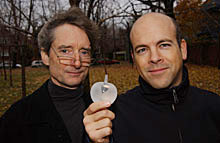Environmental award won by prototype design team

At the right, Concordia’s Martin Racine, and his collaborator Philippe Lalande,left, with the prize, a glass apple .
Photo by Bernard Lambert
A concept that might lengthen the life of that toaster of yours won first prize at a recent conference on ecological design held in Sweden.
Design Art Professor Martin Racine and a collaborator from the Université de Montréal, Philippe Lalande, won out over seven other entries in a competition that was part of Sustainable Innovation 2003, held in Stockholm in October.
The 150 representatives of business, universities and government agencies around the world who attended the conference chose the Montrealers’ concept, called PRéco. PR is short for prototypage rapide.
Racine and Lalande run a laboratory that does research on new design technologies. They feel that rapid prototyping can greatly lengthen the useful life of consumer products by modelling new or redesigned components.
Their project seeks to speed up prototyping for designers by automating production through 3D digitalization. The technology can be used to make maquettes and models of newly developed products.
Racine and his colleague started with a survey of 100 people, asking them if they had any object or appliance at home that was broken. Had they tried to fix it? If it couldn’t be repaired, why hadn’t they thrown it out?
It turned out that every one of the 100 respondents was hanging on to at least one broken thing, hoping for some sort of miracle. They were attached to these objects, despite the fact that because of their irreplaceable or inaccessible working parts, they would cost more to repair than to replace.
The researchers concluded that society hasn’t really accepted the prevailing climate of planned obsolescence. Racine said, “Parts haven’t been designed for disassembly and repair, and people aren’t satisfied with that.”
PRéco would work like this. Suppose you have a broken-down food processor. You take it to the hardware store. The owner, after establishing that he can’t fix it on the spot, goes to his computer and downloads the file for that part of the food processor from the manufacturer. He then sends it to a rapid prototyping site, which prints a 3D prototype of the part. This makes it possible to create the missing part and repair the food processor.
Racine admits that there’s a “technological gap”; printing a prototype or model is not as helpful as producing a working component. Moreover, it might be impossible to get into the machine to replace the broken part.
However, the project is part of a drive by designers to push the manufacturing industry into taking more responsibility for what they produce. Making consumer goods easier to repair could be seen as an attack on the volume sales of goods, but Racine said he and other ecologically minded designers simply want to see the economy shift emphasis from manufacturing to service.
Concordia’s Department of Design Art is strongly focused on ecology, from class projects that require students to create imaginative designs using old furniture to cutting-edge research by faculty members like Racine and his collaborator.
PRéco is financed by Hexagram (the Institut de recherche/création en arts et technologies médiatiques). For more information, go to www. préco.ca.